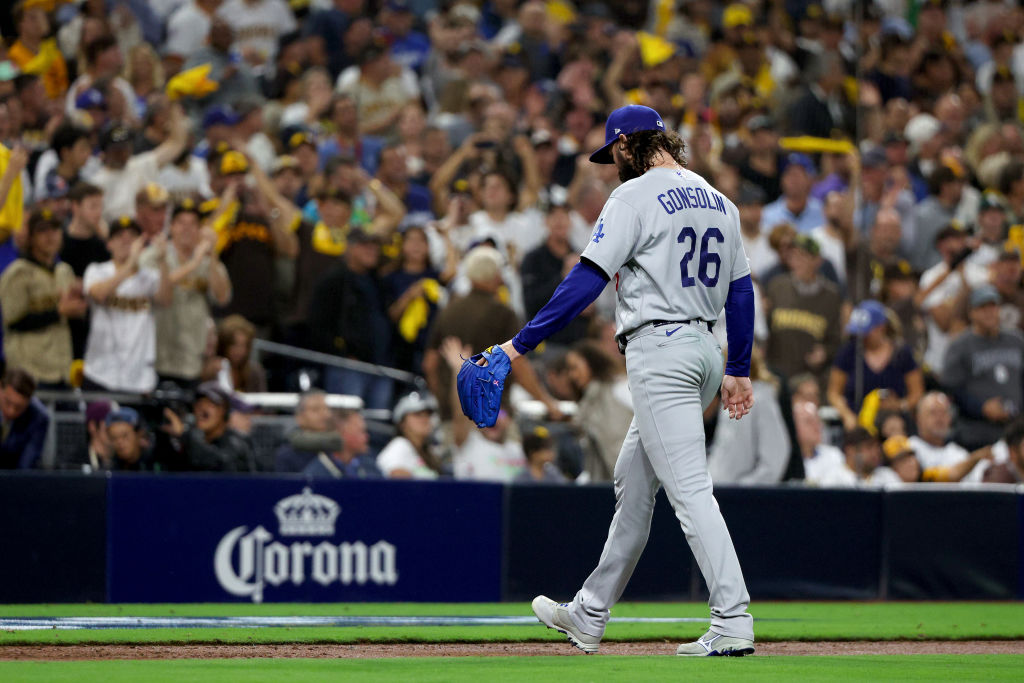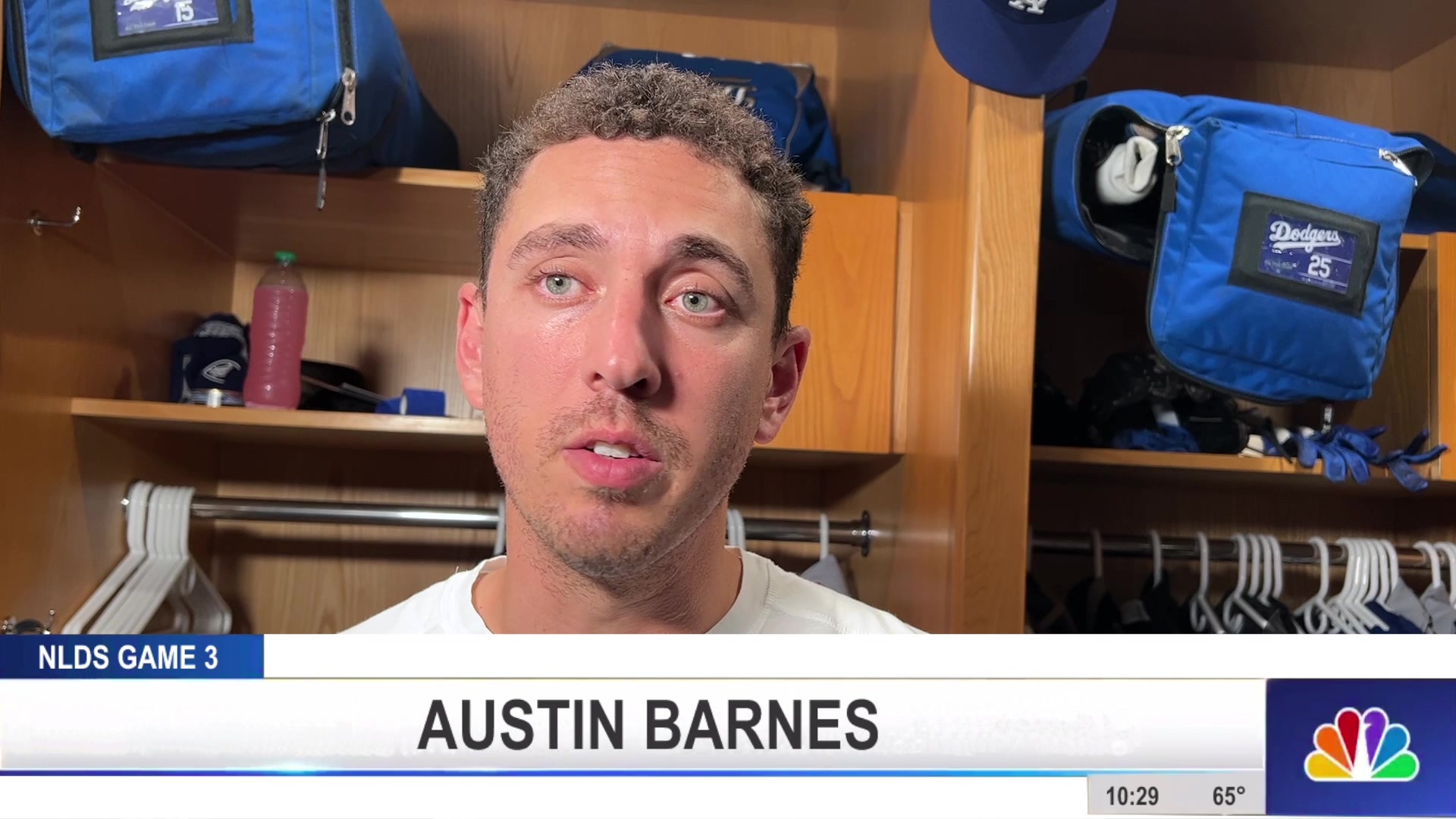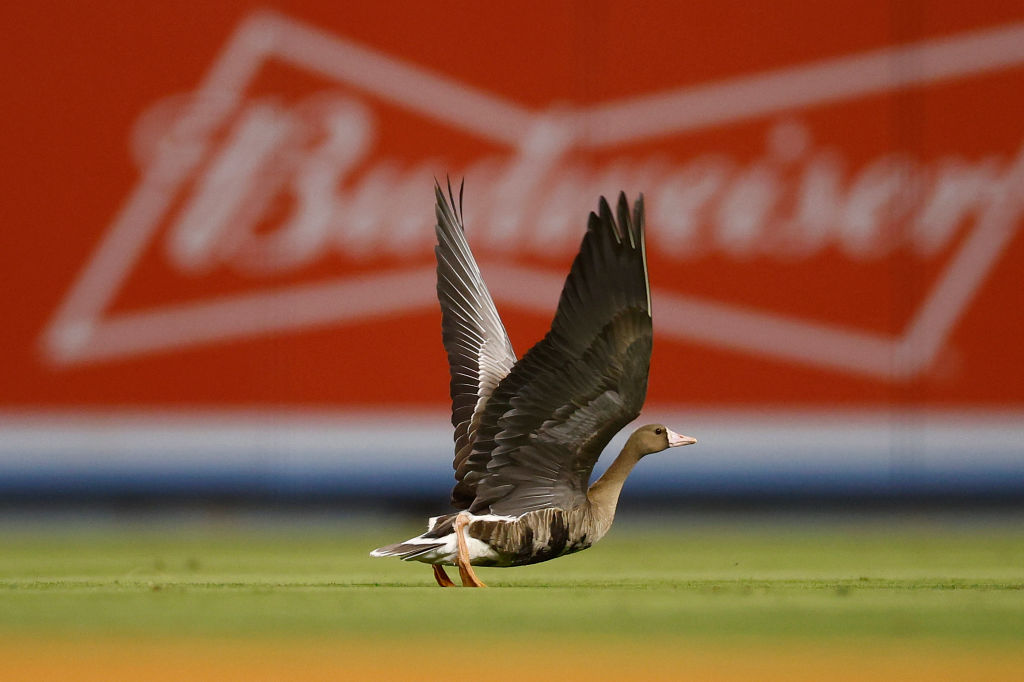A fifteen minute moment during a four-hour game was all that was needed to explain why the Los Angeles Dodgers historic season was doomed.
They led by three runs with just nine outs to go in the National League Division Series. They entered the game on the brink of elimination, but they had been in that same spot last October and rallied to win the last two games of the series.
This year was different.
This time, the Dodgers didn't charge back from the brink like they did in 2020 and 2021. This time they wilted like a starving flower in winter when the moment was the brightest.
Get Southern California news, weather forecasts and entertainment stories to your inbox. Sign up for NBC LA newsletters.
The greatest season in Dodgers history ended Saturday night with a whimper in a 5-3 loss to the San Diego Padres in Game 4 of the NLDS.
Fifteen minutes. That's all it took to change the course of history.
Tommy Kahnle entered the bottom of the seventh in relief. He walked the leadoff hitter. Back-to-back singles gave the Padres their first run and ran Kahnle from the game. Yency Almonte entered in relief in the fireman role, a spot normally reserved for Evan Phillips.
"He [Evan Phillips] was going to finish the game for us," said Dodgers' manager Dave Roberts about saving Phillips for the ninth inning instead of the seventh. "At that point in time where they were at in the order, we felt that Yency [Almonte] was the right guy there."
But Almonte wasn't the right guy. He allowed a double to Ha-Seong Kim and a single to Soto tied the game at 3-3. Suddenly, Petco Park became the new appointed screaming spot for San Diego fans.
Almonte made one pitch to Jake Cronenworth before Dodgers' manager Dave Roberts came with the hook, opting for San Diego native Alex Vesia instead. Vesia hung a slider and the rest is history.
Rain delayed the start of Game 4 by 30 minutes, but maybe it was foreshadowing. The baseball Gods had come to rain on the Dodgers decade of dominance over the Padres.
In last year's NLDS, the Dodgers turned to their big-game pitcher Walker Buehler with their backs against the wall. But Buehler is on the injured list after undergoing a second Tommy John surgery so instead they turned to—checks notes—Tyler Anderson?
That's right, the Dodgers best free agent signing of the offseason and one of their six All-Stars this season got the ball in Game 4. At 32, Anderson has only started two playoff games in his career. The first, he was a one-inning opener, but the second, was in the NLDS in 2018 with the Colorado Rockies. Anderson allowed just one run in six innings in that game.
Little did he know, that would be the experience he would draw from four years later in a do-or-die elimination in Game 4. Anderson dominated the Padres on Saturday night, allowing just two hits, with two walks, and six strikeouts over six shutout innings.
"It felt similar to that [environment]. Milwaukee has really good fans and they have really good fans here," said Anderson of his start and the environment at Petco Park. "At the end of the day you're out there playing baseball. When you go out there and take the field and start making your warmup throws it's the same thing you've done every time. There's just a little bit more noise."
Noise wasn't the problem for the Dodgers in this series, neither was the pitching. When the Dodgers look back at this series they can point the blame at the offense.
Heading into Game 4, the Dodgers had gone 19 consecutive at-bats without a hit with runners in scoring position. That streak extended to 20 after Will Smith stranded Freddie Freeman at second base to end the top of the first inning.
But even on the brink of elimination, and with a 20 at-bat hitless streak with RISP, the Dodgers offense looked confident and coordinated in their approach at the plate.
Mookie Betts worked a one-out walk in the third inning. Trea Turner followed with a double down the left field line, and Freeman finally broke the streak with a two-run double down the right field line that gave the Dodgers a 2-0 lead.
"That felt like the hit that would break it open for us," said Turner about the Dodgers struggles with runners in scoring position. "It just didn't happen."
They would tack on one more run with a sacrifice fly in the top of the 7th, but with runners on second and third base and one out, they failed to get the big hit--again--that would have broken the game open. Instead, the Padres broke it open a few minutes later.
"That ended up costing us," admitted Roberts of the top half of the seventh inning. "There was an opportunity to tack on, and we couldn't do that. You saw the Padres able get hits with guys in scoring position and scratch and claw their way back into the game and tack on. We just couldn't do that."
The Dodgers were the superior team on paper. They defeated the Padres 14 out of 19 times in the regular season. None of that mattered over a five-day stretch in October.
The Padres knack for elevating their play once the postseason began is commendable. The Dodgers consistency in doing the opposite nine out of the last ten years, is not.
"They all suck," said Dodgers' designated hitter Justin Turner on falling short nine of the last ten years. "The goal is to win a championship and to fall short of that in any round, it doesn't matter when or how, it doesn't feel good."
Before the season began, Dodgers' manager Dave Roberts audaciously predicted that they would win the World Series this year. For the last six months, he's seemed like a prophet. Now, he's more like a punchline.
"I'm shocked. I'm disappointed. It's crushing," said Roberts after the loss. "Each guy gave everything they had all year long, and it was a tremendous season. The great thing about baseball is the unpredictability, and the tough thing about it is the same thing. Things could have gone either way today to impact the result of the game. It didn't. We got beat in a series. Nothing I can say is going to make it feel any better. Obviously we didn't expect to be in this position. Again, this hurts everyone because we didn't accomplish our goal, and that's the bottom line."
The Dodgers can drive home now, replaying the last three games in their head as their bus travels back up the 5 freeway to Chavez Ravine. When they arrive back at Dodger Stadium, one thing is for certain: they will not be playing baseball there. Not this year anyway.
In the years to come, the Padres' accomplishment may grow to the stuff of legends. The Dodgers won 111 games—the second highest total in National League history.
Let that set in for a second. They crushed their opponents by huge margins and had the largest run differential (+334) in National League history. The Padres were three loses away from missing the playoffs entirely.
"Who's your daddy now, baby?" said a shirtless Manny Machado celebrating in the Padres' clubhouse after the game. "They've beaten us all year, but here we are. Here we are. We're going to the Championship series."
Meanwhile, the Dodgers will be remembered in the same way as the 2011 Mariners: as one of the biggest disappointments in postseason history. The Mariners at least won a playoff series, the 1954 Cleveland Indians, who also won 111 games, made it all the way to the World Series before their collapse. The Dodgers only lasted four games.
"Whatever happens in the regular season doesn't matter. It doesn't matter if you won 111 games, it doesn't matter if you won 88 games," said Turner. "It's about winning three games and they accomplished that."
It's true the Dodgers were under the most pressure. After winning 111 games, it would be all for naught if they didn't win the World Series, right?
"Yeah," said a downtrodden Betts answering that very question after the loss. "No matter what you do in the regular season, it's all for naught if you don't come out of it with a championship. It's super cool to win that many games, but it means absolutely nothing if you lose in the postseason. Winning in the postseason is not easy. Nobody is just going to roll over and hand you wins. You have to earn it and we didn't."
The Dodgers didn't deserve to win this series. The Padres did. Bearing the burden of being the best team in baseball for the last seven months simply got to the Dodgers when all of the pressure was on them. San Diego was not supposed to be in this position. The Dodgers were.
So by the time the seventh inning gut punch by San Diego had settled in, the Dodgers were mentally already booking their flights to Cancun for next week.
But not the Padres. San Diego will now play the Phillies for the National League pennant.
"We've been playing with intensity up to the end of the season," said Padres' manager Bob Melvin. "There's probably something to be said that when you're playing well and you have a lot of confidence, you get into the postseason and there isn't much expectation on you. I think that helped us."
As the Dodgers stood stunned watching their rivals to the south celebrate, I looked around and thought to myself the city of San Diego has suffered a lot. They lost their football team, they lost the division, and they had never seen a playoff win at Petco Park before Friday. Now, they are just four wins away from the World Series.
"These guys [the Dodgers] dominated us year long, but we got hot at the right time," said San Diego's Game 4 starter Joe Musgrove. "You can see the unity in this group and this fan base. We wanted to give it to these people so bad. These fans deserve to celebrate tonight. It's a changing of the tide. It's about to be a party out here tonight."
This new playoff format, expected to reward the teams with a first-round bye, instead doomed them. The 89-win Padres and 87-win Phillies will now square off with a chance to go to the World Series while the 100+ win Mets, Braves, and Dodgers watch from their couch.
"You know, I think that's something that we could probably debate, but I think leading up to it, even right now, it's not something that we want to look at as an excuse," said Roberts about the five-day layoff the bye allotted his team because of the new playoff schedule. "That's kind of the format the way it is, and you do the best you can in the regular season to put yourself in a position to get home-field advantage, to get the bye in the Wild Card round, and it's up to us to kind of prepare ourselves the best way we can to get through a Division Series, and we didn't."
Turning regular season success into postseason celebrations is not guaranteed. It's something the Dodgers know too well. Just ask the 2017 and 2019 teams. Just ask last season's 106-win team that lost to the 88-win eventual champion Atlanta Braves.
The Dodgers have been to the postseason 10 straight years. That's regularly enough that the consistency of getting into the tournament is simply no longer enough. The dreaded narrative that the Dodgers, "can't win the big one," is no longer fallacy, but reality. They really have become the Braves of the 1990s.
The Dodgers are not a dynasty, but a dud.




